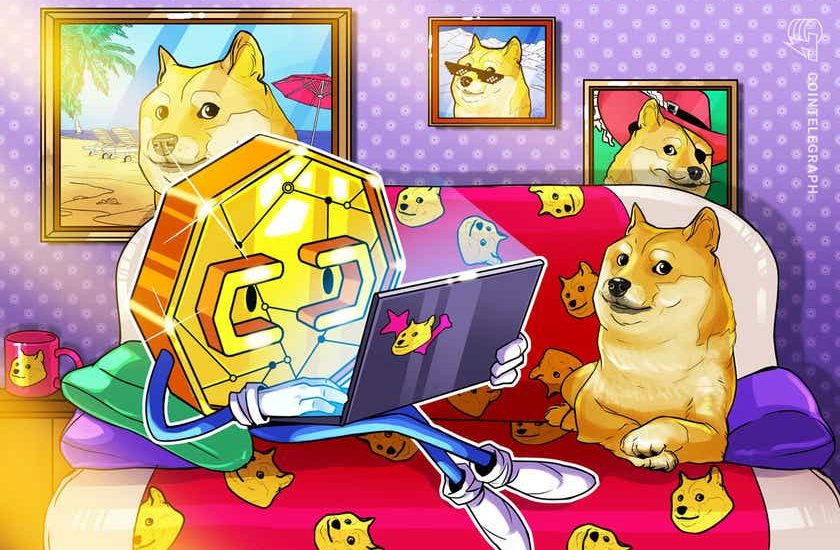- November 12, 2021
- Posted by: admin
- Category: BitCoin, Blockchain, Cryptocurrency, Investments


Some analysts point to Binance’s pause on DOGE withdrawals as the catalyst for the altcoin’s pullback, but data suggests overheated derivatives markets may have been a factor.
Dogecoin (DOGE) is potentially at risk of losing critical support if the price falls from the ascending channel traded in for the last 53 days. Although technical analysis is not an exact science, a daily close below $0.26 will likely invalidate the current movement.

Aside from the Bitcoin-driven headwinds, which are weighing on DOGE price, this week, the meme token underwent a software upgrade and users were requested to implement version 1.14.5. Two important security patches were involved: “Remote Code Execution in Dogecoin QT” (CVE-2021-3401) and “Sensitive Information Exposure on Unix platforms” (CVE-2019-15947).
The latest release finalized a new minimum fee recommendation, following a previous version’s reduction of relay and mining defaults. Additional changes included Berkley DB and OpenSSL updates and SLIP44 compatibility for the HD wallet deviation path.
Binance exchange faced issues after the upgrade
Even though users and developers did not experience any setbacks from the changes, Binance exchange unexpectedly suspended all Dogecoin network withdrawals on Nov. 11.
@michilumin, a Dogecoin core developer, explained that Binance had pending transactions due to insufficient fees for a couple of years. Despite recommendations by DOGE developers, the exchange failed to redirect those dormant transactions to their own wallets.
Yes, we’re aware, with Binance. Situation is that Binance, when a dogecoin tx, even years ago, was insufficient fees; they just re-issued those transactions (Didn’t do RBF or anything) , and assumed that the insufficient fee transactions would remain ‘stuck’ forever….
— Michi Lumin (@michilumin) November 11, 2021
As the 1.14.5 upgrade successfully lowered fees, those pending transactions were eventually approved, unbeknownst to Binance.
Curiously, in February, Binance founder CZ expressed concerns about Dogecoin being “centralized” and “abandoned.”
Some pros/risks of #Doge.
Pros: Cool, fun, PR manager @elonmusk. Decentralized in the sense there are no “core team”. It’s abandoned.
Risks:
1 address holds 27% of all #DOGE.
Top 20 addresses holds more than 50%+ of all #DOGE
Kinda “centralized” in that sense.
“abandoned”.— CZ Binance (@cz_binance) February 4, 2021
Futures markets could have fueled DOGE’s correction
Surely enough, the Binance withdrawal restriction news could have been behind the recent price weakness down to $0.25. Still, it’s also possible that derivatives markets played an important part because Dogecoin’s open interest was facing a key resistance.

Unlike volume data, futures contract open interest provides a better picture of investors’ total risk exposure. Regardless of the trading activity, which can momentarily cede after strong price movements, open interest will remain high as long as players keep their positions afloat.

Notice how the previous 4 attempts to break the $1 billion futures open interest mark resulted in substantial price corrections. Currently, the indicator stands at $850 million, so the imminent risk seems behind.
However, a 17% positive price move to $0.30 could potentially bring the DOGE derivatives metric back to the feared $1 billion open interest. There’s also the possibility of traders re-opening their leverage positions and inflating the open interest regardless of the price change.
Therefore, the classical chicken and egg problem stands before us: was Binance’s issue the leading cause for the recent crash below the 53-day ascending channel, or was it bound to happen due to excessive leverage positions?
Either way, DOGE traders should keep a close eye on that derivatives indicator to avoid further surprises.
The views and opinions expressed here are solely those of the author and do not necessarily reflect the views of Cointelegraph. Every investment and trading move involves risk. You should conduct your own research when making a decision.
